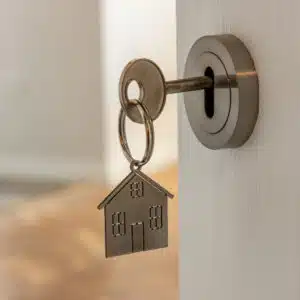Iowa’s current housing market in the state is “very hot,” according to data from Zillow. The sector leans more toward a sellers’ market, as home values have gone up an average of 4 percent from December 2017 to December 2018, and are forecast to continue to increase by about 1.5 percent this year.
Currently, the median home value in Iowa is $142,300, with the median price per square foot standing at $123. On average, the price of listed homes is around $169,000, but the median price of those successfully sold is a bit lower, at $153,100.
While Iowa has a lower-than-average rate for foreclosed homes (0.8 per 10,000, compared to 1.2 per 10,000 for the national average), foreclosure rates are expected to impact home values over the next few years.
While more macro elements will surely impact current mortgage rates in Iowa, other local economic factors will influence rates as well. These can encompass things like competition among Iowa’s lenders, state laws, and above described home values and foreclosure rates.
It’s important for consumers and prospective buyers to understand these local and national factors, in addition to the other numerous elements that can affect mortgage and financing rates in Iowa. We’ll take a closer look at the types of things that can affect rates, as well as best practices to help prospective buyers get the best possible deal on their home loan.
Quick Nav: Iowa Mortgage Rates
- Rate Factors in Iowa
- Get the Best Rate in Iowa
- Best Mortgage Companies in Iowa
Current Mortgage & Refinancing Rates in Iowa
Elements That Affect Mortgage Rates & Refinancing Rates in Iowa
There are several key factors that impact mortgage and refinancing rates in Iowa. Those searching for a home in this state should be aware of and understand how these elements can affect rates, as this can yield considerable savings. In short, it’s helpful to leverage these factors when shopping and comparing offers and different loan options.
Let’s take a look at the key elements that might affect current mortgage rates in the state of Iowa:
- Credit score: The three-digit number associated with consumers’ credit history can have a great impact when it comes to both initial mortgage rates as well as refinancing options. A good credit score, for instance, signals that consumers are creditworthy and pay their bills on time. Mortgage lenders will be more willing to work with those who have higher credit scores, as it means a lower risk for their organization. This is particularly true for refinancing.
- The size of the loan: A larger loan can create more risk for lenders as there is a higher potential for loss if the amount is not repaid on time. In this way, larger loan amounts usually translate to higher mortgage and refinancing rates for consumers.
- The down payment amount: In addition to the loan amount, the required down payment will also affect the interest rates offered to a borrower. Being able to make a larger down payment will earn customers a lower rate, as this payment can lower the loan-to-value ratio and, therefore, the risk in lending.
- Competition among lenders: The local market in regions of Iowa and the number of available lenders can also impact rates. Higher competition among these financial institutions can lead to lower rates in areas that have saturated lending markets. This is true for both mortgage and refinancing options.
- Loan terms: The term or length of the loan agreement will certainly impact the rate. A mortgage with a longer-term, for instance, will typically feature a higher interest rate, creating a greater risk for lenders when compared to shorter-term loans. In this way, rates can vary greatly between 15-year and 30-year mortgage loans, for example.
How to Get the Best Mortgage & Refinancing Rates in Iowa
One of the best strategies for getting a favorable mortgage or refinancing rates in Iowa is to compare different options and offers among lenders in the area. Currently, about half of all borrowers admit to considering options from a single lender before applying, and 77 percent only apply with one broker.
Failing to comparison shop can cause consumers to miss out on significant savings, which could amount to hundreds or thousands in the loan or refinancing costs on an annual basis.
In this way, comparative shopping is of considerable value here. Those ready to embark on this journey should keep these best practices in mind when looking for the best mortgage and refinancing rates in Iowa:
Check with multiple lenders in the area
First and foremost, it’s important to compare the offerings and services of different lenders in the region. As noted, many consumers fail to shop around and only seriously consider working with a single lender. Even small differences among loan options can add up to significant savings. For example, a lender that offers a loan at a half percent lower than another lender can support approximately $60 in savings each month.
Consider different options
In addition to comparing offerings from lender partners, it’s also important to compare different options, including various loan types and terms. As noted, a longer-term loan will result in a higher rate. In addition, a fixed-rate mortgage will have the same rate over the life of the loan, whereas the rate associated with an adjustable-rate mortgage (ARM) can change depending on market conditions.
Work to get pre-approved
In terms of mortgages, it can also be helpful to obtain pre-approval for a loan. Pre-approval signals to lenders that consumers have confidence in their ability to make the appropriate down payment and as well as consistent monthly payments throughout the loan agreement.
Elements that can impact pre-approval include consumers’ credit scores, other income information, and other assets. Working to become pre-approved can help speed the loan process later on.
Don’t forget to read the fine print
It’s imperative for consumers to understand all the costs and fees associated with a mortgage. These added expenses can include things like underwriting or broker fees, closing costs, and payment penalties. Factoring in these costs during the shopping process can help prospective buyers avoid surprises down the road.
Negotiate
Finally, consumers should negotiate with their lenders to get the best rate. This is particularly true for refinancing loans. While some elements and fees can be negotiated, other amounts may be fixed and cannot be changed by lenders. For instance, there may be some wiggle room on the initial application fee, the appraisal report, document preparation fees, recording fee, and credit fee.
Negotiating fees can significantly reduce the total cost of refinancing.
Recommended Companies in Iowa
There are several options for mortgage and refinancing in Iowa. Keep in mind that it’s best to compare the different rates and offerings among these companies to get the best rate. Some of the leading loan officers in Iowa include:
- J.G. Wentworth: This organization offers both mortgages and refinancing services, and has earned an A+ rating with the Better Business Bureau. The company has an office in West Des Moines.
- Quicken Loans: This company offers mortgage and refinancing services, as well as guides, a monthly payment calculator, and an online application. Quicken Loans has earned awards for customer satisfaction in primary mortgage origination for the previous nine consecutive years from J.D. Power.
- Ally Bank: This company provides loans, refinancing and more, as well as options for fixed or adjustable-rate mortgages over several different terms. Consumers can get pre-approved online and can benefit from Ally’s competitive rates.
- Lending Tree: This organization offers several options, including fixed- and adjustable-rate mortgages and jumbo loans. Prospective buyers can obtain near-immediate quotes online for the streamlined comparative shopping process.







